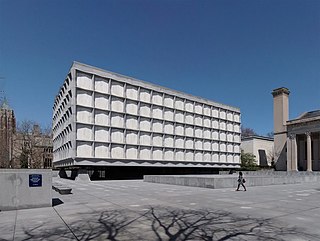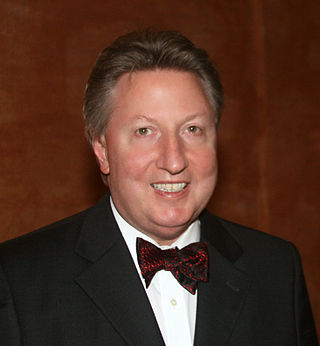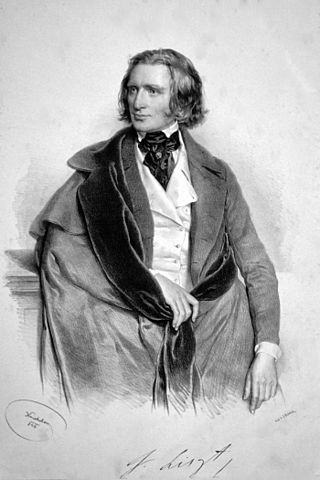Related Research Articles

Franz Liszt was a Hungarian composer, virtuoso pianist, conductor, and teacher of the Romantic period. With a diverse body of work spanning more than six decades, he is considered to be one of the most prolific and influential composers of his era, and his piano works continue to be widely performed and recorded.

The Beinecke Rare Book & Manuscript Library is the rare book library and literary archive of the Yale University Library in New Haven, Connecticut. It is one of the largest buildings in the world dedicated to rare books and manuscripts and is one of the largest collections of such texts. Established by a gift of the Beinecke family and given its own financial endowment, the library is financially independent from the university and is co-governed by the University Library and Yale Corporation.

Karl Tausig was a Polish virtuoso pianist, arranger and composer. He is generally regarded as Franz Liszt's most distinguished pupil and one of the greatest pianists of all time.
Bagatelle sans tonalité is a piece for solo piano written by Franz Liszt in 1885. The manuscript bears the title "Fourth Mephisto Waltz" and may have been intended to replace the piece now known as the Fourth Mephisto Waltz when it appeared Liszt would not be able to finish it; the phrase Bagatelle ohne Tonart actually appears as a subtitle on the front page of the manuscript.
The Mephisto Waltzes are four waltzes composed by Franz Liszt from 1859 to 1862, from 1880 to 1881, and in 1883 and 1885. Nos. 1 and 2 were composed for orchestra, and later arranged for piano, piano duet and two pianos, whereas nos. 3 and 4 were written for piano only. Of the four, the first is the most popular and has been frequently performed in concert and recorded.

The Piano Sonata in B minor, S.178, is a piano sonata by Franz Liszt. It was completed in 1853 and published in 1854 with a dedication to Robert Schumann.

Schwanengesang (Swan Song), D 957, is a collection of 14 songs written by Franz Schubert at the end of his life and published posthumously:
- Liebesbotschaft (text: Ludwig Rellstab)
- Kriegers Ahnung (Rellstab)
- Frühlingssehnsucht (Rellstab)
- Ständchen (Rellstab)
- Aufenthalt (Rellstab)
- In der Ferne (Rellstab)
- Abschied (Rellstab)
- Der Atlas (Heinrich Heine)
- Ihr Bild (Heine)
- Das Fischermädchen (Heine)
- Die Stadt (Heine)
- Am Meer (Heine)
- Der Doppelgänger (Heine)
- Die Taubenpost (alternative: D 965a) (Johann Gabriel Seidl)

The Fantasy on Themes from Mozart's Figaro and Don Giovanni, S.697, is an operatic paraphrase for solo piano by Franz Liszt, based on themes from two different Mozart's operas: The Marriage of Figaro, K.492 and Don Giovanni, K.527.
The Concerto pathétique (S.258/2), completed in 1866, is Franz Liszt's most substantial and ambitious two-piano work. At least three piano concerto arrangements of the work have been made by other composers, based on Liszt's suggestions.

Leslie John Howard is an Australian pianist, musicologist and composer. He is best known for being the only pianist to have recorded the complete solo piano works of Franz Liszt, a project which included more than 300 premiere recordings. He has been described by The Guardian as "a master of a tradition of pianism in serious danger of dying out".

Arthur Friedheim was a Russian-born concert pianist and composer who was one of Franz Liszt's foremost pupils. One of Friedheim's students was Rildia Bee O'Bryan Cliburn, the mother of 20th-century piano virtuoso Van Cliburn.

The Yale University Library is the library system of Yale University in New Haven, Connecticut. Originating in 1701 with the gift of several dozen books to a new “Collegiate School," the library's collection now contains approximately 14.9 million volumes housed in fifteen university buildings and is the third-largest academic library system in North America and the second-largest housed on a singular campus.

Papyrus 50 (Gregory-Aland), designated by 𝔓50, is an early copy of a small part of the New Testament in Greek. It is a papyrus manuscript of the Acts of the Apostles, it contains Acts 8:26-32; 10:26-31. The manuscript palaeographically has been assigned to the 3rd/4th century. Elijah Hixson suggests that the manuscript may possibly be a forgery based on anomalies in line spacing, some text seeming to wrap around lacunae, and serious issues with fiber alignment in the papyrus.
La lugubre gondola, a piano piece, is one of Franz Liszt's most important late works, written in 1882.

The Great Fantasia and Fugue in G minor, BWV 542, is an organ prelude and fugue by Johann Sebastian Bach. It acquired that name to distinguish it from the earlier Little Fugue in G minor, which is shorter. This piece is not to be confused with the Prelude and Fugue in A minor, which is also for organ and also sometimes called "the Great".
The Consolations are a set of six solo piano works by Franz Liszt. The compositions take the musical style of Nocturnes with each having its own distinctive style. Each Consolation is composed in either the key of E major or D♭ major. E major is a key regularly used by Liszt for religious themes.

Les quatre élémens, S.80, is a cycle of four choral pieces by Franz Liszt, to words by Joseph Autran. The cycle was composed in 1844–48, originally with piano accompaniment, later orchestrated. The title is an allusion to the Ancient Greek elements: earth, air, water, and fire. As an afterthought, Liszt composed an overture for the cycle in 1849–50, but this was instead revised to become his symphonic poem Les préludes.
Toshiyuki Takamiya in Tokyo, Japan is a Japanese academic and author. Emeritus Professor at Keio University since 2009, he is an authority on medieval English literature and medieval English manuscript studies and a collector of antiquarian books.

Via Crucis, S.53, is a work for mixed choir, soloists and organ by Franz Liszt. The work is devoted to the Stations of the Cross. It is one of the last works of Liszt.